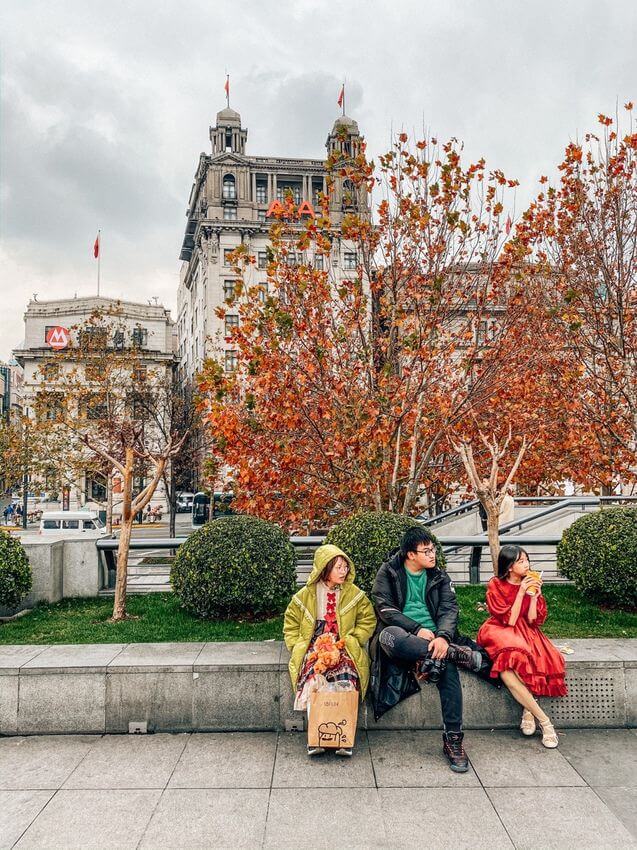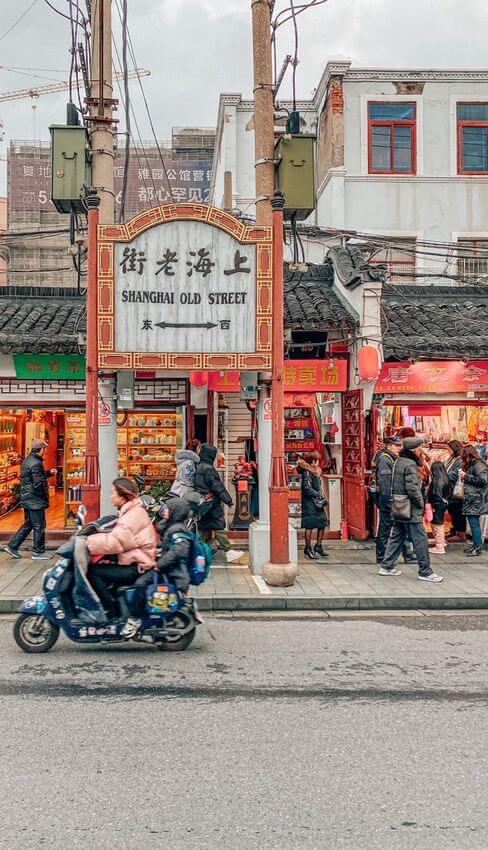The Pros & Cons of Living in Shanghai as an Expat
Are you planning to become a Shanghai expat? Maybe you are already in Shanghai (上海市) and are looking for some insight into expat life in a city that rivals New York and Paris in terms of modernity and boasts cultural and historical aspects from both Western and Chinese cultures. This need-to-know guide for expat living in Shanghai provides great information and resources for new or soon-to-be Shanghai expatriates. But even if you have been in Shanghai for a while already, you may still find the pros & cons of living in Shanghai as an expat. As well as more insight into expat life in Shanghai.

The Pros & Cons of Living in Shanghai as an Expat
Most expat Westerners come to China for work and many foreigners are sent by their company on an expat assignment for a few years or sometimes only a few months. Others come to find work on their own. For many businesses with global ambition, China is only a jumping-off point for moving further into other countries. Many expatriates are accompanied by a trailing spouse/partner and children and sometimes also children.
And only a small proportion of them has prior experience working with Chinese people or Chinese companies.
I spent one and a half years working and living in Shanghai. This was my first international move, so I didn’t know much about the experience. In Shanghai, I worked as a front-end developer at an influential software company. This was my first international move, but I just completely loved living in Shanghai.
As one of China’s most populous cities, the city can be overwhelmingly intense, but this also means there are endless opportunities here.
Read Next: 3 Days In Shanghai: The Perfect Itinerary
What I’ve found during my stay in China is that Shanghai is a city with many faces. After taking numerous day trips from Shanghai I gradually realized that other cities too can be as different from each other as in Europe. Contrary to popular Western belief, there’s really no one-size-fits-all experience to follow when it comes to moving to China. It is a country as diverse as any other in Asia, with every city and its people providing a unique experience to those who visit.
I have been to several cities in Greater China including Shanghai (where I lived), Hong Kong, Beijing, and Shenzhen. My experiences in all four cities were unique and nuanced for a variety of reasons, including history, politics, and location.
About Shanghai, China
With a population of more than 24 million (with over 10 million migrants), Shanghai is certainly different from anywhere I had ever been, even in China. It is one of the largest and traditionally the most dynamic and developed metropolis that is also very busy, and full of life.
China’s most important industrial hub is also a fascinating mix of East and West. Shanghai’s traditional lifestyles mix the most effective of China’s past and present and amalgamate it together in an exceedingly distinctive manner. While residing in this bustling city, I got the chance to appreciate historic shikumen houses that had European architectural influence. As there were so many foreign concession areas (designated districts) to Western countries during the turn of the 20th century, in many places the city has a cosmopolitan feel.
As with any other city in the world, there are pros and cons of living in Shanghai. In this post, I’ve put together all the things I love and dislike about Shanghai. These are important things to consider before deciding whether you wish to call Shanghai your new home or not. Let’s take a closer look!
The Pros And Cons of Expat Life in Shanghai
Pros of Living in Shanghai
The City Bursts With Unique Experiences
There’s no shortage of interesting things to do in Shanghai. From art shows to music festivals, there is invariably some sort of event taking place in Shanghai. Living in Shanghai as an expat, you will get to explore the city. Walk along the Nanjing Road, or explore the are around the French Concession. At night, I also recommend strolling the Bund Promenade for an exquisite sight of the Huangpu River, and paying a visit to Xintiandi district filled with upscale restaurants, and bars. These are particularly popular among young crowds and expatriates.
Multicultural Diversity
Shanghai is a city with a rich multicultural backdrop. A city where the traditional culture of Jiangnan (also known as Haipai culture) meets modernity and the traditions of the East exists in peace with European and American cultures. Thus, Shanghai attracts folks from all over the world due to a sheer number of opportunities.
As the city continues to grow, it’s easy to notice the increasing population of expats in Shanghai. This is one of the few places in China where foreigners can rub shoulders with fellow citizens, hear a wide range of accents and languages and eat dishes from across the globe. Living as an expat in Shanghai is a wonderful way to experience other countries, cultures, and people.

Personal Safety
Shanghai is a very safe place to live as an expat. It was ranked one of the safest cities in China because of its low crime rates. While most crimes are limited to pick-pocketing and minor thefts on public transport, expats are advised to keep to well-lit areas of the city at night.
In my personal experience, living in Shanghai feels super safe. I have never had any issues walking along the streets in Puxi, Pudong and Jing’an late at night. The police is always vigilant and is particularly active in safeaguarding the expat community in Shanghai. However, it is still a good idea to zip up your bags, keep your wallet safe and your eyes peeled.
Foodie Paradise
Shanghai is a food paradise for those who love to eat. The food here is cheap, tasty, fast to prepare and it tastes so different from Western food. From soup dumplings (xiao long bao) to flavourful Shanghai-style fried noodles to steamed buns… at least you know you’ll never go hungry here.
In terms of food, this sprawling megapolis has it all. Three-star Michelin standard dining is available for everyone who can afford it, while inexpensive but delicious street food is there for the frugal expats. Visit Xiangyang Road food stalls and South Yunnan Road food street for an unforgettable dining experience. Try the Chai Pan wonton (柴爿馄饨) soup or Hong shan yu (baked sweet potato, 烘山芋), available on most street corners, or one of a million ways of cooking noodles.
In Shanghai, expats can find chains like TGI Friday’s and Hooters, but there are also tons of international restaurants. Shanghai boasts Japanese restaurants, Korean, Italian, Lebanese… the list goes on. One of my favorite places here is a Bavarian pub with dark wood tables and chairs. They have the most amazing schnitzel, roast pork, and currywurst!

Healthcare Services
Health issues are a big concern for many people moving to Shanghai. While expat community tends to avoid local hospitals and clinics, private healthcare facilities have everything that expats can ever expect. There are also several clinics that have special wings catering only for foreigners if you need treatment locally.
World Link, Shanghai United Family Hospital and Shanghai East International Medical Clinic are the primary healthcare providers, but there are others.
Moving to Shanghai with children is generally considered safe. You should also check that your employer has appropriate medical insurance in place for you or buy international health insurance before traveling to China. Health plans for expats offer varied levels of international medical coverage. The main thing – they ensure that expats never have to worry about the medical bills and can always seek the best treatment available within a given area. It is also good to remember that private medical costs in Shanghai are some of the most expensive in the world and are often as expensive as you will find in Hong Kong or the United States.
Shanghai as an expat-friendly city, however, the city has still to go a long way to ensure drinking-water safety. Chances are you will be probably be frequenting the cleaner parts of the city, but tap water is still the biggest No-No here. Wash fruit and veggies well in purified water, you should be fine.
Cons of Living in Shanghai

It Could be Hectic Sometimes
Being one of the most populated cities in China, the variety of individuals and their actions could feel overwhelming for a novice expat. There’s no way to avoid it. After a while, you just get used to it. However, you still may want to adjust your work schedule if your employer allows you.
Rush hour is a nightmare. I’ve actually left my apartment to go to office/meet friends up to two hours earlier than necessary just to avoid that peak time travel. Shanghai is packed with numerous metro lines. But even with trains every 2 or 3 minutes during rush hour, it can be an uncomfortable intimacy. Like any big city, Shanghai is notorious for its heavy traffic. Alternatively, there’s a great bike-sharing system!
Renting an Apartment in Shanghai can be Expensive
Shanghai is one of the most expensive cities in China, particularly when it comes to renting an apartment. Depending on where you live in Shanghai and amenities, a 100 square meter apartment in a typical relatively new complex might cost from 6000 RMB ($860) to 15,000 RMB ($2150) per month.
If you’re looking for an apartment that won’t bust your budget start your search from SmartShanghai.com. I’ve had a good experience using real estate agents that specialize in real estate rentals. Some of these offer their services online. Oftentimes good real estate agents can be found by going to the area you are interested in and looking for prominent real estate offices along major roads and often near popular housing areas.
The rent in China is usually paid a month in advance. The property owner usually requires two months’ rent as a deposit, in addition to your first month of rent paid upfront. There is a lot of competition when it comes to high-quality real estate in Shanghai. Chances are the future landlord will ask to pay a security deposit to make sure he will hold the rental property for the new tenant. Of course, things would be so much easier for you if you can count on the support of your employer or friends.
Where to Live in Shanghai for Expats

If you’re wondering “Where do expatriates live in Shanghai?” here are some popular districts:
- Downtown Puxi. An extremely convenient neighborhood for youngsters and single people want to be close to bars, restaurants, and shops.
- Hongqiao and adjacent Gubei, and Jinqiao on the Pudong Side. These are the prime areas to consider if you’re coming to Shanghai with kids. While they tend to be well outside of the really fun and convenient downtown area, the district boasts an excellent transport network, a selection of international schools.
- Qingpu, Minghang, Songjiang Qu and Zhudi. The most affordable suburbs in Shanghai tend to be situated in the west and southwest and are further away from the city center. Arguably, these are the most affordable locations in the city. Expats with family and children should also consider these neighborhoods because of their proximity to international schools. But everything comes with a price – these tend to be very remote from the city center.
Sweltering Heat in Summer and Extreme Cold During Winter
While shoulder season is considered the best time to visit Shanghai, if you’re an expat you should know that Shanghai’s weather is hot and oppressively humid in the summer and surprisingly chilly in the winter. But there’s a perk – the spring and the fall provide absolutely marvelous weather.
The hot season (summer) isn’t the best time to begin your expat life. Chances are you’ll find yourself moving from one air-conditioned environment to another, most likely with haste. Because the humidity is at its highest. The government mandates on power usage in public buildings restrict air conditioning usage to no lower than 26°C (78°F) in the summer. Thus outside of your apartment, there is often little escape on days when the humidity levels are too high.
Read Next: Macau Travel Guide
For weeks, it will seem as if the daytime temperature is stuck at 32°C (90°F) which feels more like 40°C (104°F) due to the humidity. Annually, Shanghai has about 10 days that reach 35°C (95°F) which, when you add in the humidity, is extremely hot.
During the wintertime, January and February, Shanghai gets quite chilly. It’s not the temperature so much (temperatures rarely drop below freezing) as it is the humidity amplifying the effect of the cold, which seems to go right through your clothes. The central government has a policy that restricts temperatures in buildings to no more than 20°C (68°F) during the winter months in order to conserve energy. The thing that might surprise you about the expatriate life in Shanghai in winter is that you have to wear winter jackets indoors in an effort to save energy and money.

Pollution
I want to say one more word about Shanghai air pollution though. While Shanghai’s air quality is not nearly as bad as in Beijing, pollution is still a big health issue that concerns residents and expats alike. Of course, the city is not always covered in a permanent blanket of smog. There are many days when the sky is blue and the air is fresh. Especially in the autumn and spring when the weather is warm and pleasant to get outside and enjoy a mild temperature.
Nevertheless, on some days (particularly in winter) there is a haze around skyscrapers. Things are getting better as the authorities have made some significant strides towards improved air quality in many Chinese cities, including Shanghai. However, it still makes sense for expats to check the pollution levels online before venturing outdoors. That said, expat accommodation usually has a sophisticated array of air filters, indoor air quality meters and further back-up filters to ensure breathable air and a safe environment.
Censorship
Yup, overcoming Internet censorship in China can be a challenging task. Even with a virtual private network (VPN), the sites are slow and will not respond the way you are used to. Dubbed ‘the Great Firewall’ there is a government-driven block that aims to prevent the likes of Facebook, Twitter, and Instagram taking control of Chinese digital airspace. Go to Google.com, you get an error message.
The way around it is to install a VPN (ideally before you go) so your device appears to be coming from the United States, Australia or Japan. Problem (usually) solved. However, don’t fool yourself that China’s digital infrastructure is poor. As soon as you arrive you’ll see people constantly tapping, scrolling and swiping on their smartphones. WeChat – a kind of Facebook/WhatsApp hybrid is preferred by a staggering 900m Chinese users. It enables you to chat with friends, make payments by linking to your bank account, create and customize your own mini-site within the WeChat app and many more!
Another great travel app to download is Didi, which is the Chinese counterpart of Uber and has an English interface. Sometimes it’s not easy to hail a taxi. Oftentimes taxi drivers ignore foreigners trying to flag them down on the street. Thus Didi can save a lot of time and frustration.

Learning Mandarin
Finally, there is a communication issue. I took Mandarin lessons during my first eight months in Shanghai, but it is not an easy language to learn. Realistically, I’ll never be fluent in Mandarin. However, you really need to learn a few basics as soon as you can, the greetings, a few numbers, the time and directions for communicating with taxi drivers and most importantly learn how to haggle (how much, too expensive). Keep in mind, most locals do not speak English, but it is possible to survive without it.
Pretty much all of the street signs and the metro are in English and most of the western bars and restaurants have English-speaking staff as well. There is also the sheer number of expat events happening all the time. You’ll find many courses or classes in English, from photography to designing to Web design to filmmaking. However, a simple Xie Xie (thank you) goes a long way!
Read Next: The Ultimate Travel Guide to Backpacking China
What makes things more complicated is that some people in Shanghai speak also Shanghainese, which is virtually a whole other language. Luckily, the expat community is only usually required to know the basics of Mandarin.
At times, the lack of skills in Mandarin and lifestyle made me feel as if I was missing something and not really experienced Shanghai the way I should. I’m not going to pretend – it’s difficult for an expat to get under the surface layer of the city unless you live there for many years or have a local partner who can help you get acquainted with the local culture quickly. Don’t feel guilty about your situation.
The Bottom Line
There’s always something happening in Shanghai. The city has developed into one recognizable and well-established place for expats with plenty of career opportunities. I met so many people in China who have earned enough money in their first year here to afford a Ferrari.
Not me, though. While I find Shanghai an attractive city to live in, getting here requires a lot of work. In other words, do your research before moving here. Learn everything you need to know about Chinese work visa requirements and get them sorted out for your upcoming move.
Moving to Shanghai can drastically change your life. It will obviously be different, but embracing the differences is a good way not to become overwhelmed by them. Shanghai is a wonderful city. I’m grateful for being able to live and work here for one and a half years. The final confession: come with a positive attitude and an open mind, and you will have a great time. Safe travels!





Nina | Lemons and Luggage
Shanghai sounds like a challenging but very interesting city!
Eileen M Loya
I have always wanted to visit Shanghai. It sure looks like a nice place to visit and possibly stay for a year or two. I know how to speak Mandarin, but sadly, I can’t read the characters. I have lived in Taipei for 2 years and it was an experience I treasure up to this day. Hopefully, I get a job offer in Shanghai. That would be fantastic!
Kendall Dickinson
So interesting – would love to visit!
Roamy
I`m so fixed in my world I could not have imagined (upto now) that anyone will want to move to Shanghai but them I have never lived abroad so it`s logical to me that if there is a time I may need to move abroad, it will be a country where I speak the language and maybe understand the culture a bit.
thanks for sharing, really informative and educative.
Karin Louzado
Sounds so familiar! I’ve lived an expat life in Dubai/UAE for 13 years and Shanghai has many similarities in the pros and cons: the rich multicultural backdrop, the safety, the extreme climate and censorship. Never been to Shanghai – eager to visit!
MindTheTravel
Hey Karin! I never had a chance to live in Dubai but I heard about its thriving expat community. It’s so frustrating to hear that Dubai also has strict governmental censorship. Have you used VPN services to bypass the censorship?
Gearoid McSweeney
Shanghai sounds like an adventure. I’ll bet it’s a great jumping off point for travel to other places in China and Asia.